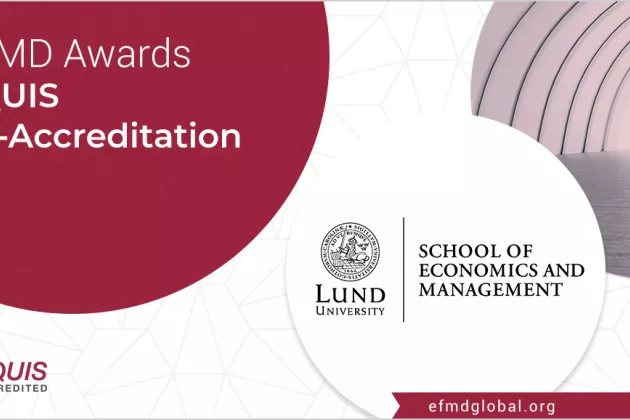Burak Tunca is senior lecturer in Digital marketing and deeply interested in the AI developments in his field. As of the autumn semester 2024, he is also responsible for the integration of artificial intelligence in the education of the Department of Business Administration at Lund University School of Economics and Management (LUSEM).
”It's not a question of whether we should integrate AI into teaching, but how and when. The time for hesitation is over. We do know that almost all students are using AI, but we don’t know how. As educators, we need to prepare students to be leaders in an AI-driven world. We can’t leave them alone with this,” says Burak Tunca.
AI as a natural part of teaching
In the first year of having a person responsible for AI integration at the Department of Business Administration, the focus will be on mapping and creating a strategy. In the long term, Burak Tunca hopes that the curricula’s learning outcomes will include formulations about AI.
The bulk of Burak Tunca's position as senior lecturer will still consist of teaching.
“I will focus on making AI a natural part of the teaching at the department. This includes developing knowledge and tools, and organising workshops and seminars for teachers. I hope that we can develop completely new assignments within our courses where AI becomes part of the assessment criteria.”
“AI is here to stay”
He has been closely following developments in the impact of AI on digital marketing in general, and ChatGPT in particular, since its launch about 1.5 years ago.
“In the beginning, most teachers were most concerned about cheating. Now, I feel we have lost a lot of time: AI is here to stay and we need to integrate it as a natural part of our lectures and teaching.”
Is it common for business schools to invest in projects like yours, with a focus on AI?
“I know it exists at companies, but not as far as I know at any other business schools. But of course, I can have missed something. I think that without a direction and a director of AI integration, the implementation will be too haphazard. You need a place, a focus and a way to work with and gather all the documents and tools.”
How much do you use different AI tools yourself?
“I test a lot of different chatbots. Claude, Gemini, Llama and so on. But ChatGPT is more or less the industry standard right now. That’s something we need to discuss: how do we make sure that students have access to the best and most advanced tools?”
Knowledge still the foundation
The dangers of AI are still being highlighted from various sources, not least in terms of the risks of ’echo chambers’ and university students not learning the basics of a subject before going in and asking a bot for help. What do you say about that?
“I don’t think we need to be worried. It was the same discussion when the pocket calculator came. People thought that students would become less good at maths. But when in truth it is those who have the best knowledge in a field that will benefit most from AI – or a calculator,” says Burak Tunca, giving an example:
“I can create a marketing strategy using AI; but without knowledge, I can’t judge whether it will work or not. AI does the same job I can do myself, but faster and more creatively,” says Burak Tunca.
He explains that he tells his students that:
You are the boss. ChatGPT is your trainee. We are the ones driving the work forward. You still need to understand your field to be able to do that.
According to Burak Tunca, other learning-enhancing uses of generative AI include, for example:
- Brainstorming about business issues in the future, for example in 2100.
- Generating fictional business cases for students to analyse.
- Creating a game on a specific topic that small groups of students could play in classroom.
“Teachers are certainly still in charge of deciding whether the AI outputs are reasonable. It is like having an incredibly competent teaching assistant available 24/7.”
Will your courses in Business Administration be all about AI now?
“AI integration is important, but it doesn’t mean that AI will replace all books or lectures. It’s just a natural evolution, from algorithms in social media and Google to ChatGPT,” says Burak Tunca.






